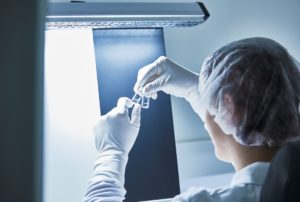 Having properly trained visual inspectors for parental drugs is important because visual inspection is a critical step in ensuring the safety, efficacy, and quality of pharmaceutical products.
Having properly trained visual inspectors for parental drugs is important because visual inspection is a critical step in ensuring the safety, efficacy, and quality of pharmaceutical products.
Visual inspection involves examining the drug product visually to detect any defects, such as particulate matter, container defects, or other visible abnormalities that could affect the product's quality and safety. These defects could arise during the manufacturing, filling, packaging, or transportation processes.
The detection and identification of such defects is crucial to prevent contaminated or substandard products from reaching the market and potentially harming patients. Therefore, it is important that visual inspectors are properly trained to accurately and consistently identify any defects in the product, and to ensure that the inspection is carried out in accordance with regulatory requirements and industry standards.
Having properly trained visual inspectors also helps to minimize the risk of recalls, regulatory actions, and reputational damage that could result from the distribution of defective products. This helps to protect the safety of patients, as well as the financial and reputational interests of pharmaceutical companies.

